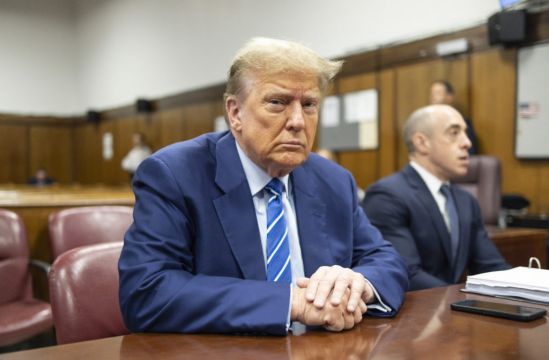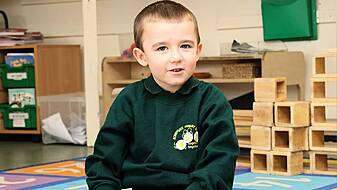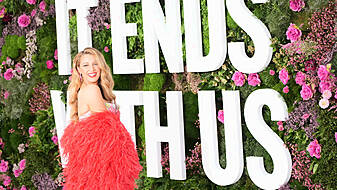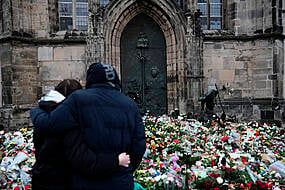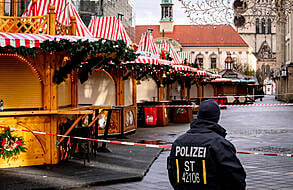The first seven jurors for Donald Trump’s hush money trial have been chosen after lawyers grilled members of the jury pool about their social media posts, political views and personal lives to decide whether they can sit in fair judgment of the former US president.
They are an IT worker, an English teacher, an oncology nurse, a sales professional, a software engineer and two lawyers.
Eleven more people need to be picked before opening statements begin as early as next week in the Manhattan case accusing the Republican of falsifying business records to cover up a sex scandal during his 2016 campaign.
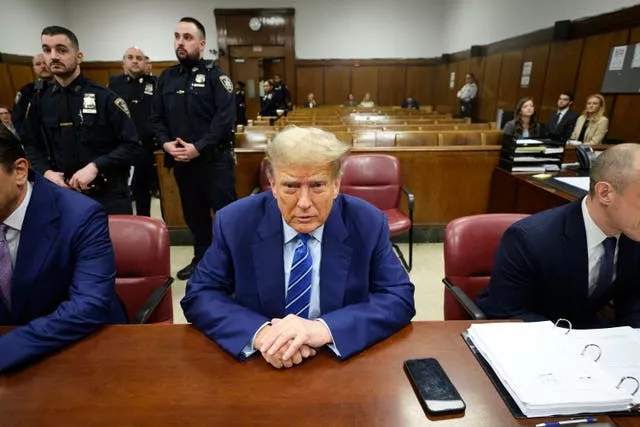
The trial, which began on Monday, puts Trump’s legal problems at the centre of his closely contested race against President Joe Biden.
It is the first of Trump’s four criminal cases to go to trial, and it may be the only one to reach a verdict before voters decide in November whether to elect the presumptive Republican presidential nominee.
On the second day of jury selection, New Yorkers were quizzed for hours about their views on Trump and other issues, and eight were excused after saying they could not be impartial or because they had other commitments.
Trump’s lawyers challenged a handful of people over social media posts, and one person was dismissed over a 2017 post about Trump that said “Lock him up!”
Several would-be jurors told the judge they believed they could decide the case fairly, no matter their feelings about Trump or his policies as president.
Trump looked on in the courtroom as his lawyers urged the judge to remove one potential juror for a social media post she made after his 2020 election loss.
The judge admonished Trump at one point after he spoke loudly and gestured while the judge questioned the woman about her post.
“I don’t know what he was uttering, but it was audible and he was gesturing. And he was speaking in the direction of the juror,” Judge Juan Merchan said.

“I won’t tolerate that. I will not tolerate any jurors being intimidated in this courtroom.”
Prosecutor Joshua Steinglass took Trump’s notoriety head-on, telling would-be jurors that lawyers were not looking for people who had been “living under a rock for the past eight years”.
They just needed to keep an open mind.
“This case has nothing to do with your personal politics … it’s not a referendum on the Trump presidency or a popularity contest or who you’re going to vote for in November. We don’t care. This case is about whether this man broke the law,” he said.
Trump has pleaded not guilty to 34 felony counts of falsifying business records as part of an alleged effort to keep salacious – and, he says, bogus – stories about his sex life from emerging during his 2016 campaign.
Before entering the courtroom, Trump stopped briefly to address a TV camera in the hallway, repeating his claim that the judge is biased against him and the case is politically motivated.
“This is a trial that should have never been brought,” Trump said.

After he went inside, reporters saw him wink at one of the court officers and mouth “How are you?” while he walked down the aisle.
Trump then took his seat at the defence table with his lawyers.
With the trial expected to last for six weeks or more, multiple jury pool members brought up plans they have for Memorial Day and beyond.
One parent was excused on Monday because of a child’s wedding in late June.
Another person was dismissed on Tuesday because of a trip they have planned.
One man was excused after saying he feared his ability to be impartial could be compromised by “unconscious bias” from growing up in Texas and working in finance with people who “intellectually tend to slant Republican”.
“I’m not sure that I can say beyond a reasonable doubt that I can be fair,” another potential juror told the judge.

“I can try. But I’m not 100% sure I can be fair.”
She was also dismissed.
One woman who said she disagrees with Trump’s policies – and sometimes finds herself frustrated by him – pledged to be fair and impartial, telling defence lawyer Todd Blanche that she would give her “level-headed best” if she were picked for the jury.
“I didn’t sleep last night thinking about could I do that,” she said.
After another juror said she would be unable to serve impartially, Trump twisted in his chair, looking in the direction of the box.
Through the first few minutes of the day, he appeared generally attentive, jotting down notes and raising sheets of paper to his face as jurors rattled off answers to a lengthy questionnaire.
Trump broke into a grin, nodding his head in an exaggerated manner, when another person said he had read two of the former president’s books, The Art Of The Deal and How To Get Rich.
The man, who said some of his wife’s family members are lobbyists for the Republican Party, said he did not think there was anything that would prevent him from looking at the case fairly.

“I feel that no-one’s above the law,” he said.
The charges centre on $130,000 in payments that Trump’s company made to his then-lawyer, Michael Cohen.
He paid that sum on Trump’s behalf to keep adult film actor Stormy Daniels from going public with her claims of a sexual encounter with Trump a decade earlier.
Trump has denied the encounter ever happened.
Prosecutors say the payments to Mr Cohen were falsely logged as legal fees.
The prosecution has described the money as being part of a scheme to bury damaging stories Trump feared could help his opponent in the 2016 race, particularly as Trump’s reputation was suffering at the time from comments he made about women.
Trump has acknowledged reimbursing Mr Cohen for the payment and that it was designed to stop Ms Daniels from going public about the alleged encounter.

But Trump has previously said it had nothing to do with the campaign.
More than half of the 96 people in the first panel of potential jurors brought into the courtroom on Monday were excused after telling the judge they could not be fair and impartial, and several others were dismissed for other reasons that were not disclosed.
In court papers filed on Tuesday, prosecutors urged the judge to fine Trump $3,000 over social media posts they say violated a gag order limiting what he can say publicly about witnesses.
In the posts, Trump called Mr Cohen and Ms Daniels “two sleaze bags who have, with their lies and misrepresentations, cost our Country dearly!”
Prosecutors wrote that the judge should admonish Trump to comply with the gag order and warn him that further violations could be punished not only with additional fines but also jail time.
If convicted of falsifying business records, Trump faces up to four years in prison, though there is no guarantee he will get time behind bars.
Trump’s cases involving allegations of election interference and hoarding classified documents could lead to lengthy prison sentences, but those cases are tied up with appeals or other issues that make it increasingly unlikely they will be decided before the election.
And if Trump wins in November, he could presumably order a new attorney general to dismiss his federal cases.
